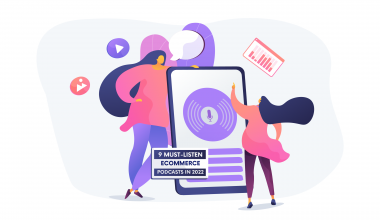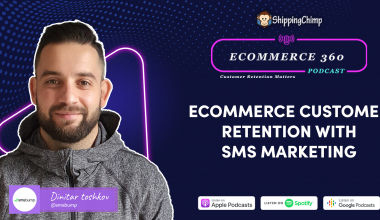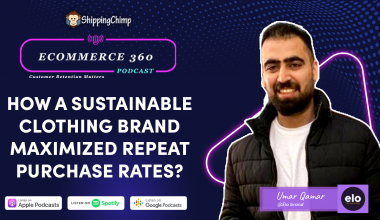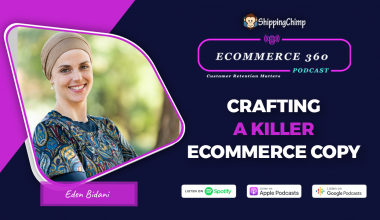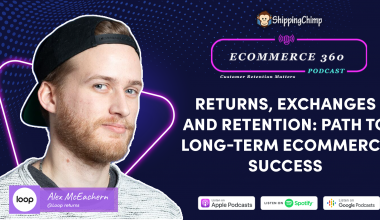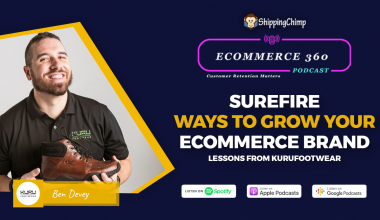Francesco, an accomplished social media strategist (Deloitte, Shopify, Brainstation), discusses the creativity and science behind virality, social commerce, and the future of shopping on Tiktok.
This blog summarises the following topics:
1. Foray of eCommerce in social media
2. Organic vs paid Which strategy works better?
3. Can a brand build sustainable viral campaigns?
4. Shopify integration with Tiktok. What does it mean for brands?
5. Future of Social commerce- Looking beyond the privacy limitations
Revathi: Hey, folks Welcome to eCommerce 360. Today we have Francesca Saraco who is a Social Media Strategist and was the content producer at Shopify, she has worked with an endless list of brands. I’m gonna try and list some of them here in Shopify, Volvo cars of Canada, RBC Royal Bank, and the list goes on.
Thank you so much Francesca for coming to our show and agreeing to help our listeners understand the importance of social commerce. Today’s topic is going to be the rise of social commerce but before we jump into that. Can you tell us a bit about yourself?
Francesca Saraco: Thanks for having me. I’m Francesca but my friends call me Fran, I worked in Social for about almost eight years now which may seem like a little bit but a lot has changed in the field since I started, I always like to contextualize that I started on social when you used to have to build a Facebook contest in a separate tab and had to phone a developer like that is you know how much the platforms have changed and really grown over the ten years of my time in the industry outside of work. I’m really focused on giving back to my community through a few initiatives that are very close to my heart. I love working out. I’m a proud peloton user which I know it’s not a personality trait but I do love it very much. I love vintage hunting, supporting local businesses but it’s something that shocked and instilled in me that I will definitely carry with me into my next adventure and cooking and eating and traveling and all those great things so yeah just love being a well-rounded human outside of work.
Revathi: That’s amazing! Let’s jump right into the topic for today’s podcast which is the rise of Social Commerce, with the recent Shopify integration with Tik Tok there has been an uptick in the number of brands that are selling socially even before this Tik Tok that was like Instagram shop and facebook shop so there have been a lot of brands which have been adding the shop button on their you know social media channels. Let’s take a step back and talk about when did it all start and what it is today
Francesca Saraco: I think in general people have often gone to social media to learn about products whether they think about it or not whether it’s directly from a brand or through a creator influencer that they admire. I think there’s you know obviously a way to do it where it’s not always such a hard sell but I think product integration has always just been part of these platforms, what I find interesting and very much a trend that we’re looking at going into 2022 is that now many of these platforms have noticed that trend, notice that the consumer behavior has led to that I think they’re seeing the high levels of conversions in transactions through very like direct response campaigns and results you know to selling on social that they actually have decided to organically integrate stores onto the platform which I think is really fascinating. We definitely saw that with Facebook and Instagram first but now with Tiktok. I know we may be familiar with the Tiktok made me buy it hashtag there are so many products that have reached you know viral zeitgeist capacity in the world from I’m trying to think obviously like even Nespresso like instant coffee at the beginning of pandemic to the pink stuff which is just like this abrasive cleaner for your sink which I also personally thought because I love cleaning it’s been a great way for people to discover products and now any business regardless of their size can actually sell their products directly on the Tiktok platform which is really cool.
Revathi: Going on to the website and then shopping for a product you can just click on your social media you know by just swiping that’s so amazing. Let’s talk a bit about organic versus page: do you think the new shop button or these integrations which allow the end-user to shop within the social media channel itself. Do you think the organic versus paid you to know the kind of war that happens is it going to end or is it going to only aggravate or accelerate the difference in the gap between the organic reach versus the paid reach?
Francesca Saraco: That’s a great question! I’ve always been of the mind that organic and paid actually should work together. I know sometimes people like to put them against each other and we definitely have organic content specialists and you know paid and growth specialists. I always feel that when you have them in harmony that really does create the most comprehensive strategy because they serve different purposes right, you want to show a little bit of if we’re looking specifically you know for the purpose of this conversation around you know products and selling on social you don’t want your organic posts to have that hard sell that’s not the point. You want to show the product being used in real life in a very aspirational way where your kind of target consumer can see themselves you know using it integrating into lifelike but not in a way that feels forced or pushy right like that’s not the point, you’re building a brand you’re building a lifestyle around this particular product that’s not to say that then you can’t target and retarget down your funnel using paid I think that that again serves a time and place for more of that direct selling. I think any time that you refuse to integrate the two into your strategy you’re just setting yourself up for failure. They really do work hand in hand and they do help you actually continue to build your audience list, retarget those potential customers and really increase the level of conversion that you’re looking to get. I’m like the peacemaker, they should be together as one and really look holistically for the best results.
Revathi: When we talk about I think about it when organic was just paid, one thing that comes to our mind is virality and with a Tik Tok as you might know already that you know there are a lot more views a lot more viral videos compared to any other platform. Have we reached the era in social media where everything is going to go viral or are there still any strategies that brands can hack into?
Francesca Saraco: I think that’s also that’s a great question when it comes to virality like in my career I’ve always hated when people have been like the objective is for this to go viral you can’t make something go viral you can try you can make something that is compelling and that people want to share but by no means can you manufacture virality and anybody that tells you that might be pulling you know twisting your arm or pulling your leg right. I think in general if you focus on making content that your audience cares about that they engage with and that you’re seeing results with month over month that’s going to increase your chance of potentially quote-unquote having that viral moment but virality really happens when timing aligns cultural lines and the algorithm picks it up and it’s a recipe that is almost impossible to replicate. I think setting yourself up with that goal sets you up for failure also like to keep in mind that even when something goes quote-unquote viral a whole assignment of the population still hasn’t seen it right, I think it’s like social professionals were like oh gosh like you know this got like you know half a million views a million and a half years whatever it is sure but that’s like a tiny sliver of the world right so that’s why it’s important to just keep making things that people love and engage with and engage with being the operative term because nothing like makes me upset more as like content that just goes to die that like your audience doesn’t care about anybody related to your audience cares about keeping in mind the audience their needs and their desires and fitting into that is always you know the way to go and then sure if you get your viral moment amazing, but not everything has to for it to be considered good or successful.
Revathi: That’s great, that’s so vital. Should it be the goal, just keep engagement with the audience is the top priority that’s great. Let’s talk about the Shopify integration that Tiktok which is very interesting, what does it really mean for brands I mean the e-commerce brands are already making up for an introductory lot of brands that are very popular and successful and Tiktok, so what it what does it mean for brands which are not so popular or not at you know gone into Tik Tok or do not have a Tik Tok strategy in place?
Francesca Saraco: Yeah I think it just opens up a whole new possibility for their audiences right but the beauty of Tiktok our friends is that you can be a business of any size you can be an independent business you can be a seven-figure business but you can still build a storefront the cool thing about Tiktok is like the algorithm is such where that you know smaller businesses can still grow and still achieve a certain amount of reach organically so why not try why not show your product in action through a video get people excited about it so that maybe they can learn about you through this as a sales channel. I think there’s like no reason not to use it but it also really democratizes the playing field because as much as we’d love for everybody to have their own ecommerce store set up a Shopify store set up whatever the situation may be so it’s not always feasible for folks and that’s not always accessible so this adds another layer of access that is you know free of charge and allows people to really build their business and get out there.
The other cool thing too is that we know just from research that Gen z which is a very large segment of the Tiktok audience they want to be entrepreneurs they want to own their own business they don’t really want to work for a company that is like so opposite to me and I guess how I felt growing up and so we’re seeing this as the new generation of business owners really thriving on the platform and this just gives them another way to build their business and become entrepreneurs which I think is so awesome. You don’t have to be like you know 30 years old and starting your own company at 18 and wherever you are in the world and have a great idea and get people to buy it.
We’ve seen there are so many great young entrepreneurs on the platform that talks about their success but also give some really great helpful tips to the community to help them grow as well so I just think we’re going to continue to see more of that.
Revathi: That’s amazing so it’s going to you know boost the creator economy, even more, Talking about the created economy I was thinking of slipping in this question as a is it going to be biased towards influencers, you know compared to which probably a few brands cannot afford right now probably they have to get up there and be the influencer themselves, is it going to be now that you know a lot of social commerce is happening are influencers going to be the ones that are most soft and sought after by brands.
Francesca Saraco: I think it depends on what you define as an influencer, of course, they know there are people with you know half a million followers as an audience like huge huge audiences. There was an article actually by the new york times a couple of years ago that really really holds true and was very much ahead of its time where it’s talking about the rise of nano influencers and I think so what an I know influencer is is really someone with under 5 000 followers that is like a trusted member of their like immediate community but also keeping in mind that we’re seeing a trend of people moving towards curation rather than just influence like curating their favorite products showing what they use on a day-to-day basis without you know having the big brand sponsorship behind it it’s more of like a tastemaker that is starting to become popular verses like the classic influencer kind of like you know holding the product smiling talking about how they use it using my AirPods.
I think that brands if they’re strategic they can actually create really great relationships with people with smaller communities that perhaps are not looking for a huge amount of money in exchange I always say that you should be people product is now payment product not pay your bills so pay your creators no matter the size but I think it actually may allow people to again really build with like people that are not out of budget because I think people are getting kind of fatigued of like these larger influencers because like you know kylie do you really use like crest toothpaste I don’t know just a strange example so if anything I think we’re going to see the rise of smaller creators and curators and that is going to be a much more accessible solution for even brands that are just starting out.
Revathi: That’s interesting and that’s very hopeful, So talking about the future of social commerce with the rise of again a lot of privacy updates, do you think brands can still make it in social channels especially Facebook? I think it’s taking a big beating out of all these social updates. I’m sure it’s only a matter of time before this lab has some sort of privacy issue you want to talk about as well so how do brands really navigate these limitations posed by privacy challenges?
Francesca Saraco: What I’ve seen and this is purely anecdotal is that brands are just having to cast the net a little bit wider, you know people yes they may say that they’re opting out of tracking that means that their experience on the platform is not going to be as tailored for them they’re going to get a very like broad set of advertisements. I have experimented with that personally and I’ve turned off tracking and I get the weirdest Ads I’m like what the hell and I think people at some point may realize they actually didn’t mind the apps knowing them as well did.
I think obviously privacy is very important and these are important conversations to be having but I think it’s just a matter of like advertisers and businesses rethinking their paid strategy and how they can make you know add content that’s a little wider and mass audience aware versus something super niche but also again like keep in mind you still have the organic component of these platforms and knowing that you can like you know garner emails from potential customers use that to build a custom audience use that to build a lookalike audience especially on Facebook and Instagram those are still really great possibilities you just may have to get a little bit creative as to how you’re going to proceed forward. It’s all about adapting and that’s really always been the part of society that’s been the fastest, like most fascinating thing like there have been changes whether it’s been changes with reach or the algorithm or privacy or whatever it is and you adopt or you’re not successful right. Adapt or die and I think that’s a very like you know important model that holds true especially with the ios 14 updates.
Revathi: That’s very well put, so we are almost at the end of the episode I want to wrap up with one last question as a social media strategist what was this one campaign and social media any channel across Facebook or Instagram that you were completely in awe of, which probably you can describe to our listeners here.
Francesca Saraco: Most recently I had the opportunity to actually launch Shopify’s first merch store which actually was inspired by a tweet and so we had released a tweet announcing one of our first social commerce tweets actually around the shop which is our payment platform our Shopify’s CPM platform and that integration into Facebook and Instagram and that tweet just blew up for us organically so much engagement people are getting so excited and they were like when are we getting shop sweaters. We want shop sweaters so I saw an opportunity there to make some sweaters for our community and run a little contest so you know I spoke to my higher-ups figured out you know a reasonable like CPM like figured out what would make sense worked with one of our merchants to make this very limited run of sweaters and we got the engagement threshold we were looking for like that like it happened within like I want to say a minute or two and people were so excited about the sweaters we had like other painted competitors tweeting at us like what the hell like it was like the whole like twitter moment but we used that as a proof of concept for actually launching a store for our work for Shopify’s merch. Shopify had never you know as an ecommerce company they never even had a merch store so we worked across like it was very much a team after it were built from like legal and ux and design and ops and social like but social really led the way for this idea that turned into like a multi-team project and we dropped our first product which was the cha-ching button when you push it it you know said free serotonin it made the sound that the the platform makes when you make a sale which is the quintessential to change sound and we sold out in an hour our community loved it but I love how social inspired this idea but also inspired the product because one of the biggest tweets we get is the biggest tweets most popular tweets we get is how excited people are when they make that sale that sound to them is like just like a huge serotonin boost a huge mood boost so we took that insight and turned it into an actual product so it was really cool to see social act as like a physical manifestation in the world of something the audience cares about and what they want and we saw the results which was so great so yeah it’s like something I’m super proud of so that’s fantastic.
Revathi: Thank you so much for coming to our show and sharing our insights.
Francesca Saraco: Thank you so much, Thanks for having me this was so much fun.

